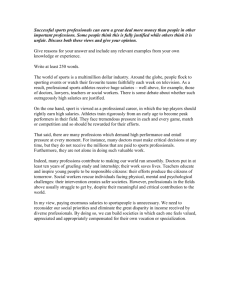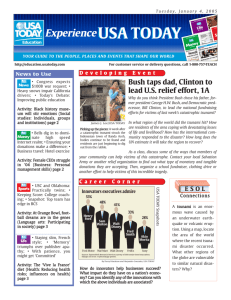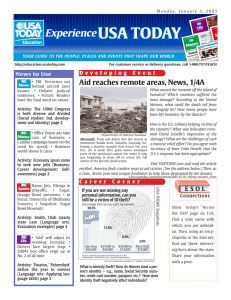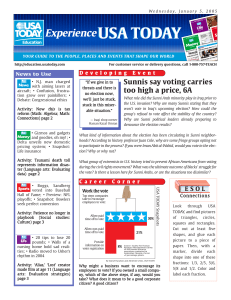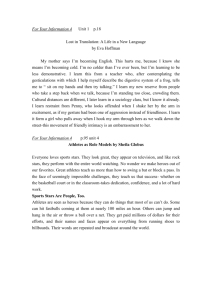NetGain 12 - Project Based.qxd
advertisement
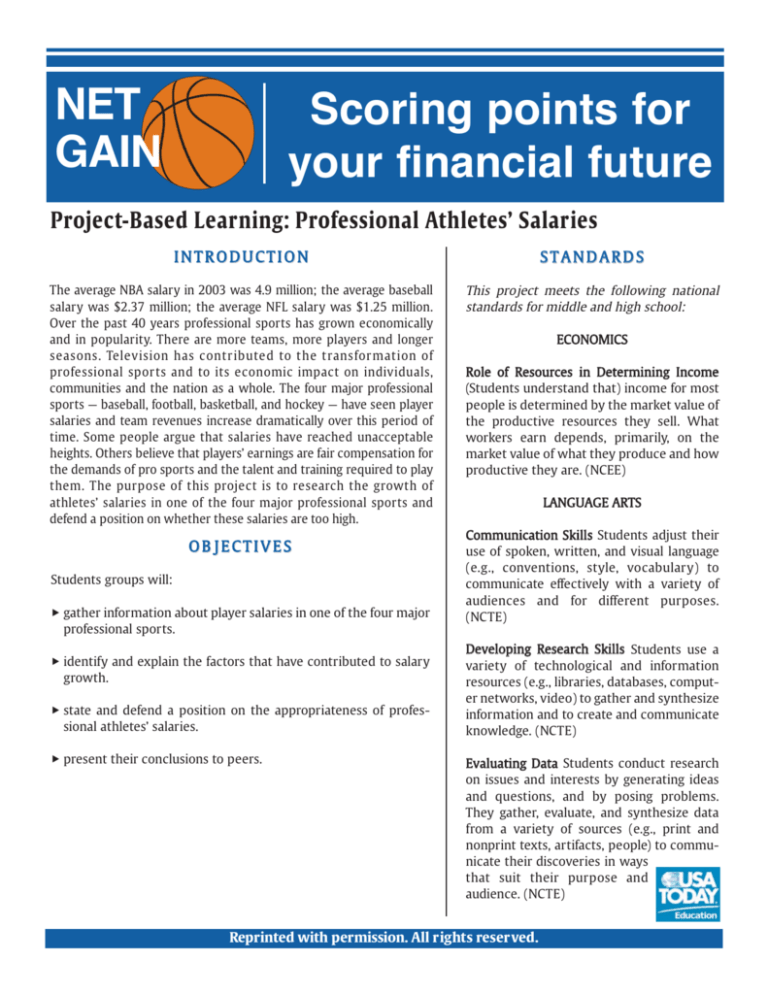
NET GAIN Scoring points for your financial future Project-Based Learning: Professional Athletes’ Salaries INTRODUCTION STANDARDS The average NBA salary in 2003 was 4.9 million; the average baseball salary was $2.37 million; the average NFL salary was $1.25 million. Over the past 40 years professional sports has grown economically and in popularity. There are more teams, more players and longer seasons. Television has contr ibute d to the transfor mation of professional spor ts and to its economic impact on individuals, communities and the nation as a whole. The four major professional sports — baseball, football, basketball, and hockey — have seen player salaries and team revenues increase dramatically over this period of time. Some people argue that salaries have reached unacceptable heights. Others believe that players’ earnings are fair compensation for the demands of pro sports and the talent and training required to play them. The purpose of this project is to research the growth of athletes’ salaries in one of the four major professional sports and defend a position on whether these salaries are too high. This project meets the following national standards for middle and high school: OBJECTIVES Students groups will: ugather information about player salaries in one of the four major professional sports. uidentify and explain the factors that have contributed to salary growth. ustate and defend a position on the appropriateness of professional athletes’ salaries. upresent their conclusions to peers. ECONOMICS Role of Resources in Determining Income (Students understand that) income for most people is determined by the market value of the productive resources they sell. What workers earn depends, primarily, on the market value of what they produce and how productive they are. (NCEE) LANGUAGE ARTS Communication Skills Students adjust their use of spoken, written, and visual language (e.g., conventions, style, vocabulary) to communicate effectively with a variety of audiences and for different purposes. (NCTE) Developing Research Skills Students use a variety of technological and information resources (e.g., libraries, databases, computer networks, video) to gather and synthesize information and to create and communicate knowledge. (NCTE) Evaluating Data Students conduct research on issues and interests by generating ideas and questions, and by posing problems. They gather, evaluate, and synthesize data from a variety of sources (e.g., print and nonprint texts, artifacts, people) to communicate their discoveries in ways that suit their purpose and audience. (NCTE) Reprinted with permission. All rights reser ved. NET GAIN Scoring points for your financial future Project-Based Learning: Professional Athletes’ Salaries DIRECTIONS W E E K 1 : During this week you should research and gather as much information as you can about the salaries of players in one of the four major professional sports. Peruse USA TODAY’s salary databases (see addresses listed below) and other sources for information on pro athletes’ salaries now and in past decades. Then, research the earnings of five other occupations, that in your opinion, require skills or training comparable to an athlete’s. (See the Department of Labor’s Occupational Outlook Handbook at the link listed below.) Record your data and reflections, and discuss them as a group. Baseball: http://asp.usatoday.com/sports/baseball/salaries/default.aspx Football: http://asp.usatoday.com/sports/football/nfl/salaries/default.aspx Basketball: http://asp.usatoday.com/sports/basketball/nba/salaries/default.aspx Hockey: http://asp.usatoday.com/sports/hockey/nhl/salaries/default.aspx Occupational Outlook Handbook: http://www.bls.gov/oco/ W E E K 2 : Now, it’s time to analyze your data. Use the information you gathered to answer the following questions: How do you measure the economic value of a profession or occupation? What criteria should be used to determine the relative value of various occupations, including those of professional athletes? What might be the consequences of paying firefighters and other public servants as much as professional athletes? Is it possible to measure the worth of a profession in dollars and cents? Finally, discuss the implications of other important data from your research. Then, decide where you stand on the issue of athletes’ salaries, and what the focus of your presentation will be. W E E K 3 : During this week your group should decide on and begin to prepare the presentation of your position on athletes’ salaries. (Possible formats include a debate, written editorial, oral presentation or staged panel discussion with "experts" role-played by group members.) Choose a format that will complement your findings and feelings on the issue. Make sure it will also captivate your peers! W E E K 4 : During this week, groups should present their position on the issue via the format they have chosen. Before beginning however, create a uniform checksheet that groups can use to assess their own and other teams’ performances. Student work should be evaluated on: ucontent uuse of sources ucreativity uquality of arguments urelevance of supporting data to arguments After all groups have presented, discuss the following questions: Was there a consensus among groups on the issue of athletes’ pay? What does this tell you? Is there a difference between a job’s economic and social value? If so, should there be? NET GAIN — SCORING POINTS FOR YOUR FINANCIAL FUTURE
